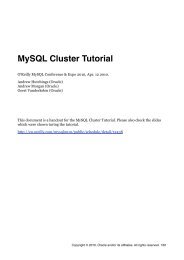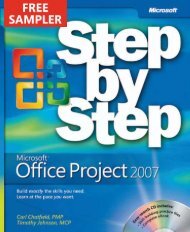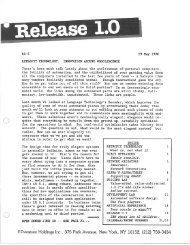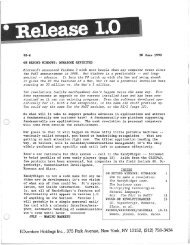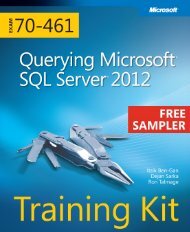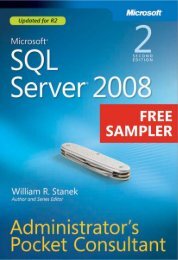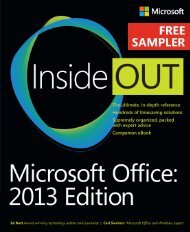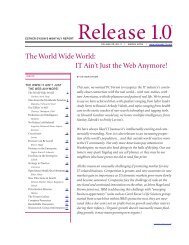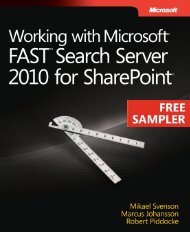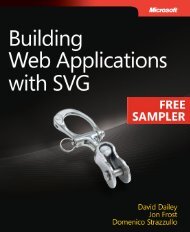Learning Python, 5th Edition - cdn.oreilly.com
Learning Python, 5th Edition - cdn.oreilly.com
Learning Python, 5th Edition - cdn.oreilly.com
Create successful ePaper yourself
Turn your PDF publications into a flip-book with our unique Google optimized e-Paper software.
• Data mining with the Orange framework, the Pattern bundle, Scrapy, and custom<br />
code<br />
You can even play solitaire with the PySolFC program. And of course, you can always<br />
code custom <strong>Python</strong> scripts in less buzzword-laden domains to perform day-to-day<br />
system administration, process your email, manage your document and media libraries,<br />
and so on. You’ll find links to the support in many fields at the PyPI website, and via<br />
web searches (search Google or http://www.python.org for links).<br />
Though of broad practical use, many of these specific domains are largely just instances<br />
of <strong>Python</strong>’s <strong>com</strong>ponent integration role in action again. Adding it as a frontend to<br />
libraries of <strong>com</strong>ponents written in a <strong>com</strong>piled language such as C makes <strong>Python</strong> useful<br />
for scripting in a wide variety of domains. As a general-purpose language that supports<br />
integration, <strong>Python</strong> is widely applicable.<br />
How Is <strong>Python</strong> Developed and Supported?<br />
As a popular open source system, <strong>Python</strong> enjoys a large and active development <strong>com</strong>munity<br />
that responds to issues and develops enhancements with a speed that many<br />
<strong>com</strong>mercial software developers might find remarkable. <strong>Python</strong> developers coordinate<br />
work online with a source-control system. Changes are developed per a formal protocol,<br />
which includes writing a PEP (<strong>Python</strong> Enhancement Proposal) or other document,<br />
and extensions to <strong>Python</strong>’s regression testing system. In fact, modifying <strong>Python</strong> today<br />
is roughly as involved as changing <strong>com</strong>mercial software—a far cry from <strong>Python</strong>’s early<br />
days, when an email to its creator would suffice, but a good thing given its large user<br />
base today.<br />
The PSF (<strong>Python</strong> Software Foundation), a formal nonprofit group, organizes conferences<br />
and deals with intellectual property issues. Numerous <strong>Python</strong> conferences are<br />
held around the world; O’Reilly’s OSCON and the PSF’s PyCon are the largest. The<br />
former of these addresses multiple open source projects, and the latter is a <strong>Python</strong>-only<br />
event that has experienced strong growth in recent years. PyCon 2012 and 2013 reached<br />
2,500 attendees each; in fact, PyCon 2013 had to cap its limit at this level after a surprise<br />
sell-out in 2012 (and managed to grab wide attention on both technical and nontechnical<br />
grounds that I won’t chronicle here). Earlier years often saw attendance double<br />
—from 586 attendees in 2007 to over 1,000 in 2008, for example—indicative of<br />
<strong>Python</strong>’s growth in general, and impressive to those who remember early conferences<br />
whose attendees could largely be served around a single restaurant table.<br />
Open Source Tradeoffs<br />
Having said that, it’s important to note that while <strong>Python</strong> enjoys a vigorous development<br />
<strong>com</strong>munity, this <strong>com</strong>es with inherent tradeoffs. Open source software can also<br />
appear chaotic and even resemble anarchy at times, and may not always be as smoothly<br />
implemented as the prior paragraphs might imply. Some changes may still manage to<br />
How Is <strong>Python</strong> Developed and Supported? | 15



